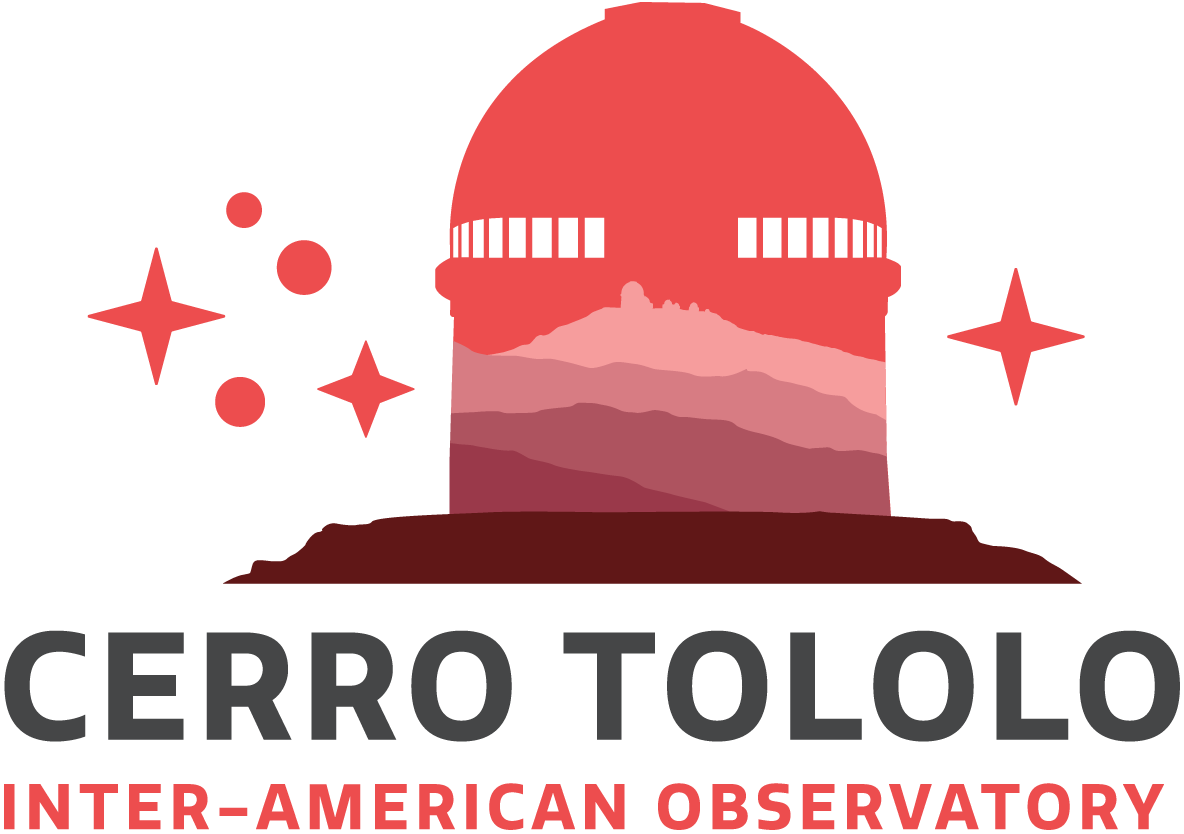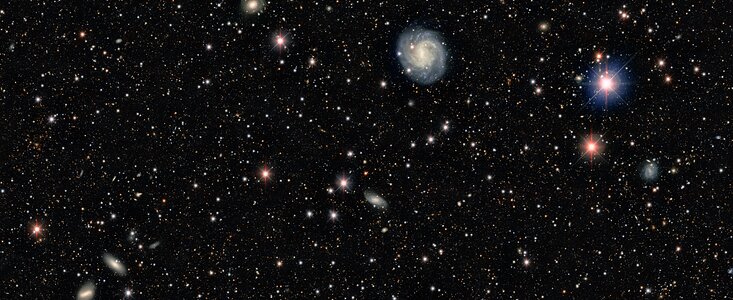DECam Takes Millionth Exposure
Astronomers celebrate a major milestone with the high-performance Dark Energy Camera on NOIRLab’s Víctor M. Blanco 4-meter Telescope
8 June 2021
Scientists working with the Dark Energy Camera (DECam), on the Víctor M. Blanco 4-meter Telescope at the Cerro Tololo Inter-American Observatory (CTIO), a Program of NSF NOIRLab and located in the Coquimbo Region of northern Chile, are celebrating a major milestone: the instrument has taken its one-millionth exposure.
One of the most powerful digital cameras in the world, the Dark Energy Camera was designed specifically for the Dark Energy Survey. It was funded by the Department of Energy (DOE) and was built and tested at DOE's Fermilab.
This milestone came while performing observations as part of the DECam eROSITA Survey. This visible-light survey is designed to follow up on targets observed in X-rays by the eROSITA X-ray instrument, which sits aboard the Russian–German Spectrum–Roentgen-Gamma (Spektr-RG) mission, an observatory that launched in 2019 to map the cosmos. At the time of this exposure DECam was making an observation of a galaxy cluster filled with hot, X-ray-emitting gas.
The DECam eROSITA Survey is being led by José Luis Nilo Castellón of the University of La Serena in Chile and by NOIRLab astronomer Alfredo Zenteno, who, working remotely from his home in Chile, was the chief observer when the image was taken.
“At the mountain, [Cerro Tololo], Hernan Tirado, Fernando Cortez, and Alberto Alvarez were the observer support and telescope operators at the moment of the observation,” said Kathy Vivas, an Associate Astronomer at CTIO and a member of the support team for DECam.
DECam is a high-performance, 570-megapixel, wide-field camera that was initially designed to work on the Dark Energy Survey. This survey ran between 2013 and 2019, imaging 300 million galaxies in order to better understand the properties of dark energy, the mysterious force causing the expansion of the Universe to accelerate. Since DES ended, DECam has been made available for use by the astronomical community at large. After an initial proprietary period (typically 18 months), all DECam images are available through NOIRLab's Astro Data Archive at the Community Science and Data Center (CSDC).
DECam’s million exposures include science observations as well as test and calibration exposures taken by the camera while it was being fine-tuned after its construction and installation on the Blanco telescope in 2012.
“To reach #1,000,000 is a milestone and a good opportunity to celebrate this wonderful instrument and look forward to the next million,” said Vivas.
More information
NSF NOIRLab (National Optical-Infrared Astronomy Research Laboratory), the US center for ground-based optical-infrared astronomy, operates the international Gemini Observatory (a facility of NSF, NRC–Canada, ANID–Chile, MCTIC–Brazil, MINCyT–Argentina, and KASI–Republic of Korea), Kitt Peak National Observatory (KPNO), Cerro Tololo Inter-American Observatory (CTIO), the Community Science and Data Center (CSDC), and Vera C. Rubin Observatory (operated in cooperation with the Department of Energy’s SLAC National Accelerator Laboratory). It is managed by the Association of Universities for Research in Astronomy (AURA) under a cooperative agreement with NSF and is headquartered in Tucson, Arizona. The astronomical community is honored to have the opportunity to conduct astronomical research on Iolkam Du’ag (Kitt Peak) in Arizona, on Maunakea in Hawai‘i, and on Cerro Tololo and Cerro Pachón in Chile. We recognize and acknowledge the very significant cultural role and reverence that these sites have to the Tohono O'odham Nation, to the Native Hawaiian community, and to the local communities in Chile, respectively.
This work is supported in part by the US Department of Energy Office of Science. The Dark Energy Survey is a collaboration of more than 400 scientists from 26 institutions in seven countries. Funding for the DES Projects has been provided by the US Department of Energy Office of Science, US National Science Foundation, Ministry of Science and Education of Spain, Science and Technology Facilities Council of the United Kingdom, Higher Education Funding Council for England, ETH Zurich for Switzerland, National Center for Supercomputing Applications at the University of Illinois at Urbana-Champaign, Kavli Institute of Cosmological Physics at the University of Chicago, Center for Cosmology and AstroParticle Physics at Ohio State University, Mitchell Institute for Fundamental Physics and Astronomy at Texas A&M University, Financiadora de Estudos e Projetos, Fundação Carlos Chagas Filho de Amparo à Pesquisa do Estado do Rio de Janeiro, Conselho Nacional de Desenvolvimento Científico e Tecnológico and Ministério da Ciência e Tecnologia, Deutsche Forschungsgemeinschaft, and the collaborating institutions in the Dark Energy Survey.
NCSA at the University of Illinois at Urbana-Champaign provides supercomputing and advanced digital resources for the nation’s science enterprise. At NCSA, University of Illinois faculty, staff, students, and collaborators from around the globe use advanced digital resources to address research grand challenges for the benefit of science and society. NCSA has been advancing one-third of the Fortune 50® for more than 30 years by bringing industry, researchers, and students together to solve grand challenges at rapid speed and scale.
Fermilab is America’s premier national laboratory for particle physics and accelerator research. A US Department of Energy Office of Science laboratory, Fermilab is located near Chicago, Illinois, and operated under contract by the Fermi Research Alliance LLC, a joint partnership between the University of Chicago and the Universities Research Association, Inc.
The DOE Office of Science is the single largest supporter of basic research in the physical sciences in the United States and is working to address some of the most pressing challenges of our time.
Links
Contacts
Kathy Vivas
Associate Astronomer
NSF NOIRLab
Email: kathy.vivas@noirlab.edu
Alfredo Zenteno
DECam eROSITA Survey Principal Investigator
NSF NOIRLab
Email: alfredo.zenteno@noirlab.edu
Amanda Kocz
Press and Internal Communications Officer
NSF NOIRLab
Cell: +1 520 318 8591
Email: amanda.kocz@noirlab.edu



